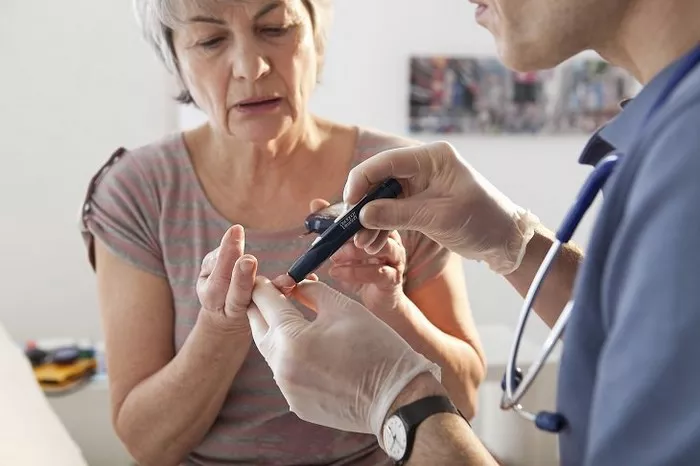Type 2 diabetes is a chronic condition that affects how the body metabolizes glucose (sugar). Achieving good diabetes control is crucial for minimizing the risk of complications and maintaining overall health. Good control involves not only managing blood sugar levels but also addressing various aspects of health and lifestyle. This article delves into what constitutes good diabetes control, including blood sugar management, lifestyle modifications, medication adherence, and regular monitoring.
Understanding Good Diabetes Control
Defining Good Diabetes Control
Good diabetes control refers to the effective management of blood sugar levels and other health parameters to prevent or delay the onset of diabetes-related complications. This involves maintaining blood glucose levels within a target range set by healthcare providers and integrating various aspects of diabetes management into daily life.
The Importance of Good Diabetes Control
Achieving good control of diabetes is essential for several reasons:
Preventing Complications: Proper management reduces the risk of both short-term and long-term complications, including cardiovascular disease, neuropathy, nephropathy, and retinopathy.
Improving Quality of Life: Effective diabetes control helps individuals lead a more active and fulfilling life by minimizing symptoms such as fatigue, excessive thirst, and frequent urination.
Enhancing Longevity: Good diabetes control can contribute to a longer, healthier life by mitigating the risks associated with uncontrolled diabetes.
Blood Sugar Management
Target Blood Sugar Levels
One of the cornerstones of good diabetes control is maintaining blood glucose levels within a target range. The American Diabetes Association (ADA) provides general guidelines for target blood sugar levels:
Fasting Blood Sugar: 80-130 mg/dL (4.4-7.2 mmol/L)
Postprandial Blood Sugar (1-2 hours after a meal): Less than 180 mg/dL (10.0 mmol/L)
HbA1c: Less than 7% (53 mmol/mol)
These targets may vary based on individual factors, including age, duration of diabetes, presence of other health conditions, and risk of hypoglycemia.
Monitoring Blood Sugar Levels
Regular monitoring of blood glucose levels is essential for assessing how well diabetes is being managed. This can be done through various methods:
Self-Monitoring of Blood Glucose (SMBG): Using a blood glucose meter to check blood sugar levels at different times of the day, such as before and after meals and at bedtime.
Continuous Glucose Monitoring (CGM): A CGM system provides real-time data on blood sugar levels throughout the day and night, offering insights into trends and patterns.
Understanding Blood Sugar Trends
Analyzing blood sugar trends helps in making informed decisions about diabetes management. For instance, consistently high blood sugar levels may indicate the need for adjustments in medication or dietary habits, while frequent low levels could suggest a need for changes in insulin dosage or meal planning.
Lifestyle Modifications
Diet and Nutrition
A well-balanced diet plays a crucial role in managing type 2 diabetes. Key dietary considerations include:
Carbohydrate Management: Monitoring carbohydrate intake and choosing complex carbohydrates with a low glycemic index can help maintain stable blood sugar levels. Examples include whole grains, legumes, and non-starchy vegetables.
Portion Control: Eating appropriate portion sizes can prevent excessive calorie intake and aid in blood sugar management.
Balanced Meals: Incorporating a mix of proteins, healthy fats, and fiber in meals helps slow the absorption of glucose and improve overall blood sugar control.
Avoiding Sugary Foods: Limiting foods high in added sugars, such as sugary drinks, candies, and pastries, is crucial for preventing blood sugar spikes.
Physical Activity
Regular physical activity is an integral part of diabetes management. Exercise helps lower blood sugar levels by increasing insulin sensitivity and promoting glucose uptake by muscles. Recommendations include:
Aerobic Exercise: Engaging in activities such as walking, jogging, cycling, or swimming for at least 150 minutes per week.
Strength Training: Incorporating resistance exercises, such as weight lifting or bodyweight exercises, at least two days a week to build muscle mass and improve glucose metabolism.
Consistency: Maintaining a regular exercise routine and incorporating physical activity into daily life can have a significant impact on blood sugar control.
Weight Management
For individuals with type 2 diabetes, achieving and maintaining a healthy weight is important for managing blood sugar levels. Weight loss can improve insulin sensitivity and reduce the need for medications. Strategies for weight management include:
Healthy Eating Habits: Adopting a balanced diet with appropriate portion sizes and reducing intake of high-calorie, low-nutrient foods.
Regular Physical Activity: Combining exercise with dietary changes to support weight loss and improve overall health.
Behavioral Changes: Implementing strategies such as mindful eating, setting realistic weight goals, and seeking support from healthcare providers or weight loss programs.
Medication Adherence
Types of Diabetes Medications
Medication adherence is a critical component of diabetes management. Various types of medications may be prescribed, including:
Oral Medications: Common classes of oral diabetes medications include metformin, sulfonylureas, and SGLT2 inhibitors. These medications work through different mechanisms to lower blood sugar levels.
Insulin Therapy: Insulin may be required for individuals with type 2 diabetes who are unable to achieve adequate blood sugar control with oral medications alone. Insulin therapy involves different types of insulin, such as rapid-acting, long-acting, and intermediate-acting insulin.
Injectable Medications: In addition to insulin, some injectable medications like GLP-1 receptor agonists can help lower blood sugar levels by improving insulin sensitivity and reducing appetite.
Adherence Strategies
To ensure effective diabetes management, it is important to adhere to prescribed medications. Strategies for improving adherence include:
Understanding Medication Purpose: Knowing how each medication works and its role in managing diabetes can help reinforce the importance of taking it as prescribed.
Setting Reminders: Using pill organizers, smartphone alarms, or medication reminder apps can help keep track of medication schedules.
Regular Check-Ups: Regular visits with healthcare providers to review medication effectiveness, side effects, and any necessary adjustments.
Regular Monitoring and Check-Ups
Routine Check-Ups
Regular check-ups with healthcare providers are essential for monitoring diabetes control and addressing any issues that arise. Key components of routine check-ups include:
Blood Glucose Testing: Regular testing of blood glucose levels to assess overall control and make necessary adjustments to the treatment plan.
HbA1c Testing: Measuring average blood glucose levels over the past 2-3 months to evaluate long-term control and adjust management strategies.
Screening for Complications: Regular screenings for diabetes-related complications, such as eye exams for retinopathy, kidney function tests for nephropathy, and foot examinations for neuropathy.
Collaborative Care
Good diabetes control often requires a collaborative approach involving multiple healthcare professionals, including:
Primary Care Physicians: Providing overall management and coordination of diabetes care.
Endocrinologists: Specializing in diabetes management and offering advanced treatment options.
Registered Dietitians: Assisting with dietary planning and nutritional counseling.
Certified Diabetes Educators: Offering education and support to help individuals manage their diabetes effectively.
Self-Care and Patient Education
Empowering individuals with diabetes through self-care education is crucial for achieving good control. This includes:
Understanding Diabetes: Educating patients about the nature of diabetes, its impact on the body, and the importance of blood sugar management.
Self-Monitoring Skills: Teaching patients how to monitor their blood glucose levels, interpret results, and make appropriate adjustments to their management plan.
Problem-Solving: Helping patients develop skills to address challenges such as managing stress, dealing with illness, and handling changes in daily routines.
Managing Stress and Emotional Well-Being
The Impact of Stress on Blood Sugar
Stress can significantly affect blood sugar levels, as it triggers the release of stress hormones like cortisol and adrenaline, which can raise blood glucose levels. Effective stress management is an important aspect of good diabetes control.
Stress Management Techniques
Several strategies can help manage stress and improve overall well-being:
Mindfulness and Relaxation: Techniques such as meditation, deep breathing, and progressive muscle relaxation can help reduce stress and improve mental health.
Physical Activity: Regular exercise can also be an effective way to manage stress and improve mood.
Social Support: Seeking support from friends, family, or support groups can provide emotional relief and practical assistance.
Addressing Emotional Health
Diabetes management can be emotionally challenging, and it is important to address mental health concerns. Strategies include:
Counseling and Therapy: Professional support from psychologists or counselors can help address feelings of anxiety, depression, or diabetes-related distress.
Diabetes Support Groups: Connecting with others who have diabetes can provide valuable insights, encouragement, and a sense of community.
The Role of Technology in Diabetes Management
Advancements in Diabetes Technology
Technological advancements have significantly improved diabetes management, offering new tools and resources for achieving good control:
Continuous Glucose Monitoring (CGM): CGM systems provide real-time glucose data and alerts for high or low blood sugar levels, allowing for timely interventions.
Insulin Pumps: Insulin pumps deliver insulin continuously through a small device, providing more precise control over insulin delivery.
Mobile Apps: Diabetes management apps can track blood sugar levels, food intake, physical activity, and medication use, offering insights and support for daily management.
Using Technology Effectively
To maximize the benefits of diabetes technology:
Learn How to Use Devices: Proper training on how to use CGM systems, insulin pumps, and other devices is essential for effective management.
Integrate Technology with Care Plans: Incorporate data from technology into your diabetes care plan and discuss it with your healthcare provider.
Stay Updated: Keep up with advancements in diabetes technology and consider upgrading devices or tools as needed to enhance management.
See also: What Blood Test for Type 2 Diabetes?
Conclusion
Good diabetes control is multifaceted, involving effective blood sugar management, lifestyle modifications, medication adherence, regular monitoring, and addressing emotional well-being. By maintaining blood glucose levels within target ranges, adopting a healthy lifestyle, adhering to prescribed treatments, and utilizing technological advancements, individuals with type 2 diabetes can achieve better control and improve their overall quality of life.
Collaboration with healthcare providers, ongoing education, and a proactive approach to managing diabetes are key to achieving and sustaining good control. With the right strategies and support, individuals with type 2 diabetes can successfully manage their condition and lead fulfilling, healthy lives.
Related topics:
What Puts You at Risk for Type 2 Diabetes?



























